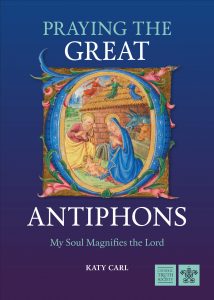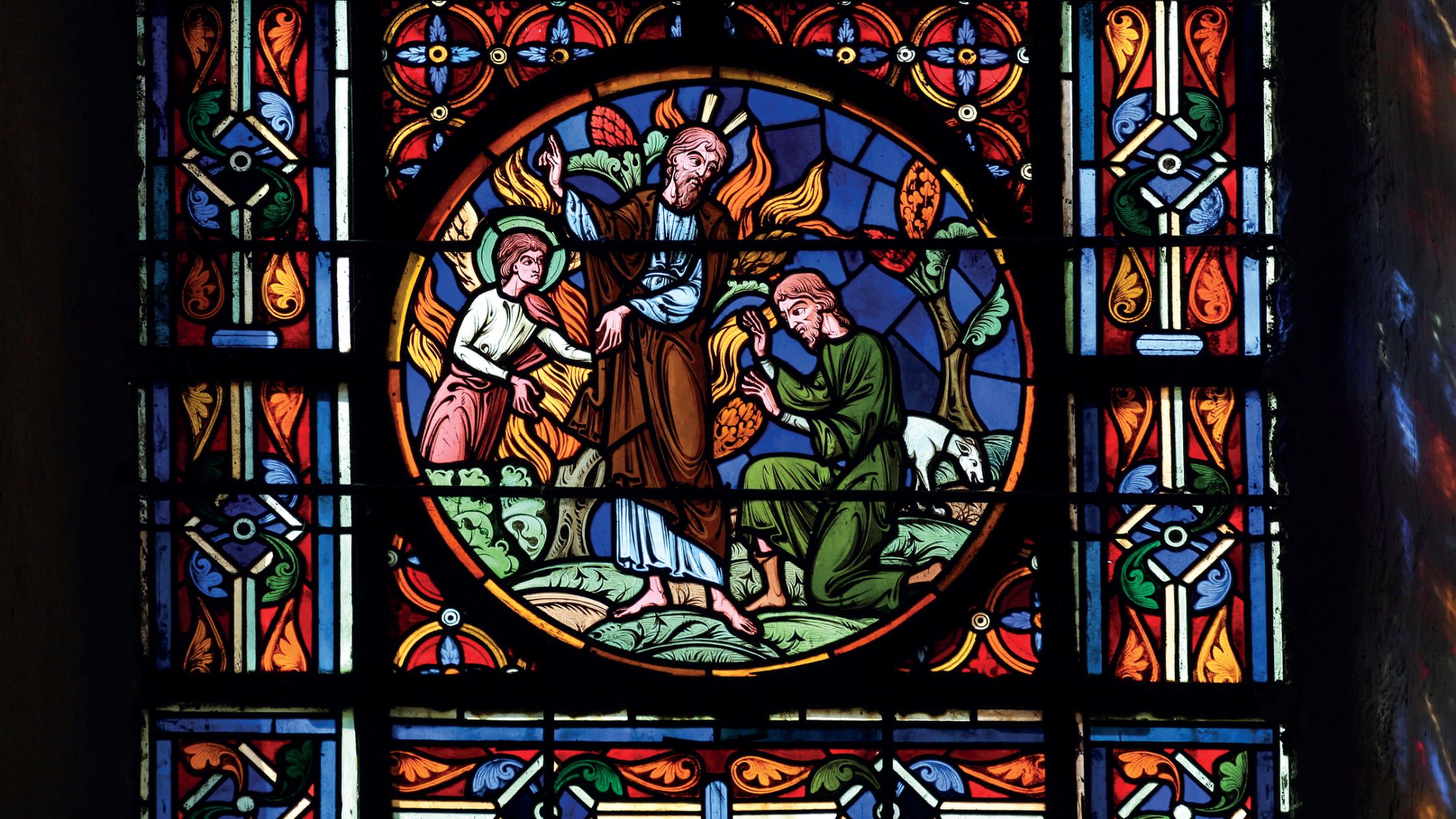In the final days of Advent, the Church recites the Great O Antiphons at Vespers each evening. In this blog extracted from Praying the Great O Antiphons, Katy Carl reflects on the second of these O Antiphons: O Adonai.
Gospel Acclamation:
Ruler of the House of Israel, who gave the law to Moses on Sinai, come and save us with outstretched arm.
Magnificat Antiphon:
O Adonai and leader of Israel, you appeared to Moses in a burning bush and you gave him the Law on Sinai. O come and save us with your mighty power.
Reflection on O Adonai
The thought that a newborn could become the king of anything at all is, historically, an unsettling idea. An adult would need to rule in the child’s place, thus threatening the line of succession and, by extension, the whole political order. Yet from the moment of Jesus’s birth, we hail him as the Ruler of the House of Israel, the lawgiver of all human life. Although on one level we can now recognise this antiphon immediately for what it is – a welcome of Jesus Christ’s deepest identity as God – it would have been by no means intuitive to the senses if we were observers at the Nativity. We might have wanted to take the wise men aside and ask them: What on earth are you doing? What use does a newborn have for a king’s treasury? Likewise, the shepherds: Why are you singing and crying, in the middle of the night, no less? It’s just a poor woman’s baby. Pipe down, can’t you? We’re trying to sleep. Their homage makes sense only if we recognise, as they instantly did, Jesus’s inherent authority and regency. But if we shift our point of view, if we put ourselves in the place of a common person of the time, for example of the innkeeper who refused the Holy Family a place, the scene becomes very strange indeed.
Then again, we may not need to travel back in history through Ignatian meditation to find unfamiliar, challenging, ideas in this antiphon. Though we are accustomed to the idea of a monarch as a symbol of authority and even to some extent a guide for a country, the idea of a ruler as powerful and influential frequently lacks the resonance for us that it had for premodern societies. So we will need to think more fully about the idea of kingship. Living in a postmodern world, we can be hesitant, even highly averse, towards the idea of answering to a higher authority than our autonomous selves or a democratic political order. Many consider divine authority either notional, a fairy tale cooked up by autocrats who want more control over others, or else like the loving but distant oversight of a long-deceased ancestor, not present or specific enough to affect anyone’s daily life. If we think of unity, we often think of it as a phenomenon arising from the grassroots of society, not imposed upon us from the top down.
Revelation suggests another picture altogether, not a political picture but a spiritual one. Revelation tells of a God whose rulership was expressed in a life lived close to his people, in which he spoke to them and guided their hearts. This God made a highly specific demand of the first humans, a demand they chose directly and deliberately to dishonour. In declining to obey God, the giver of everything in our lives that is good, they brought about Original Sin. They severed themselves – and all of us – from the unity between himself and humanity that God originally intended. They created, on their own, this human need for salvation, whose urgency runs like an electrical current through the course of these seven days of preparation. We recreate this need for salvation every time we sin – which, unfortunately, is not rare.
In allowing Original Sin, in allowing our personal and individual sin, God honours human freedom as he created it. In seeking to heal the rift sin causes, God honours the human capacity for love he created in us. He wants us to turn to him freely, not just once, but as many times as necessary: not under force, not in blind ignorance, and not lawlessly, but like Mary, in the totality and fullness of our capacity for consent. His authority, in the formula of St Augustine, commands what it gives and gives what it commands. Like the form of a poem that shapes the poet’s composition, it restricts only in order to liberate. Restraint, fully understood, is the scaffolding we climb to attain new heights. The title Adonai holds and implies all this: it is the name of a leader, a lawgiver, but one with a tender concern for the well-being of his people. He is not aloof or removed, but turned towards us, ready to hear and address our concerns.
Here again, we can allow ourselves to be startled by the contrast between the idea of the exalted “ruler of the house of Israel” and of the whole world – the Lawgiver, the Anointed One, the Chosen, the Messiah – and the image we began with: the picture of a powerless newborn lying swaddled on a cushion of straw. This image suggests vulnerability and, in that suggestion, adds still another layer of surprise. How is it that someone so clearly in need of saving – this child of a low-income family, born far from home, under a death threat from the king of his region – could ever be the Saviour? How does this helpless person act in union with
the good Father on whose Providence we depend; how does this portrait of weakness become the Good Shepherd whose strength we can trust? That so few could possibly have seen or known or understood the divine irony at the time can only add to our wonder. This aspect of the story, the contrast between weakness and strength, beneficially destabilises our vision. It demands we look anew at St Paul’s idea that God’s “power is made perfect in weakness… For when I am weak, then I am strong” (2 Cor 12:9-10).
This idea can seem dissonant to the extent that the world around us either forbids us to acknowledge human vulnerability or else invites us to exploit it for our advantage. The hardest demand of all may be to locate ourselves within this idea of strength-in-weakness: to combine an awareness of the shared human condition, and an honesty about the ways in which we have suffered, with a clear and secure sense that we are the beloved children of God.
The question of whose stories are allowed to be heard, and whose pain deserves compassion, can pose an obstacle to this awareness. In order to see rightly, we need to know that God cares about every individual without exception. He is not pleased when we shout over each other or when we allow a cruel coldness the upper hand in our dealings with each other. If, in our cultural and personal history, we have lacked examples of figures who unite strength with gentleness, sway over others with authentic concern for those others’ well-being, this can pose still another obstacle
to understanding a good and loving God, who limits and shapes his own exercise of power for our benefit. He does not need to make extraordinary displays of force to evoke our acknowledgement of what he can do. He does not throw his weight around or make extravagant demands. In a word, the God of power and might does not behave the way that humans given power generally behave. His action is subtle, gentle, and infinitely patient.
This self-limitation of God reveals his mercy and our freedom, yet at times it can also create the feeling of an incomprehensible absence. Why does God seem not to act in certain situations? Why does he permit humans to cause certain harms that genuinely damage and legitimately outrage each other’s dignity? Many saints have observed that God’s action in such situations is not absent but is hidden from us as a kindness to our limited minds. Another way to look at this might be that God’s action in other lives is often hidden from us as a protection of those souls’ privacy. Many who have survived horrors report journeying out the other side of those experiences with a firmer, more complete sense of God’s tender love in action, despite the reality of the suffering humans cause each other. Some of these experiences can be so interior and incommunicable that to demand an explanation is to demand the impossible.
So, instead of always needing to hold a perfect and clear comprehension of events – a need that often conceals a disguised desire to control those same events – we can learn to ask better questions. How can we imagine hearing the voice of God calling an abuser to repent of sins we cannot even conceive of wanting to commit, the very names of which cause pain? Can we even begin to hear how he might call a wounded soul to forgive in a voice that also grants that same power of forgiveness? How can we dare to say God is absent in a situation when we cannot fully know so many of the details of that situation, including the perspectives and inner lives of everyone involved – even when one of those perspectives is our own?
So self-knowledge, awareness of others, and under-standing of God walk hand in hand. Because of Original Sin, self-discovery is always a rediscovery: a recovery of what has been lost. At the same time, this recovery is the doing of a God who can “create in me a clean heart” (Ps 51:10) and who says to us: “Behold, I am doing a new thing” (Isa 43:19). To rediscover who we are, we must also rediscover who God is. This is why the search for God’s living and ever-new presence, implied in this prayer by the image of Moses facing the burning bush, is integrated with the idea of our burning need for a law and a Saviour. God’s saving action at one and the same time returns us to the abundant joy of our origins and, within the limits of his justice, propels us forward into his project of creating anew. Any false opposition, any either/or, between these is missing some aspect of truth. We should not rest until we receive from God the clarity we long for about such missing pieces.
Image copyright Fr Lawrence Lew OP.
 This blog is extracted from our book Praying the Great O Antiphons. In the final days of Advent, the Church recites the Great O Antiphons at Vespers each evening. Katy Carl contemplates each of these antiphons, drawing on art, literature, and Sacred Scripture to show how they tell the story of Jesus Christ, the Babe of Bethlehem.
This blog is extracted from our book Praying the Great O Antiphons. In the final days of Advent, the Church recites the Great O Antiphons at Vespers each evening. Katy Carl contemplates each of these antiphons, drawing on art, literature, and Sacred Scripture to show how they tell the story of Jesus Christ, the Babe of Bethlehem.
To learn more about the O Antiphons, order your copy of Praying the Great O Antiphons today.
